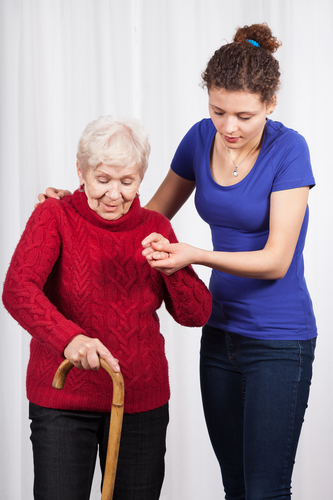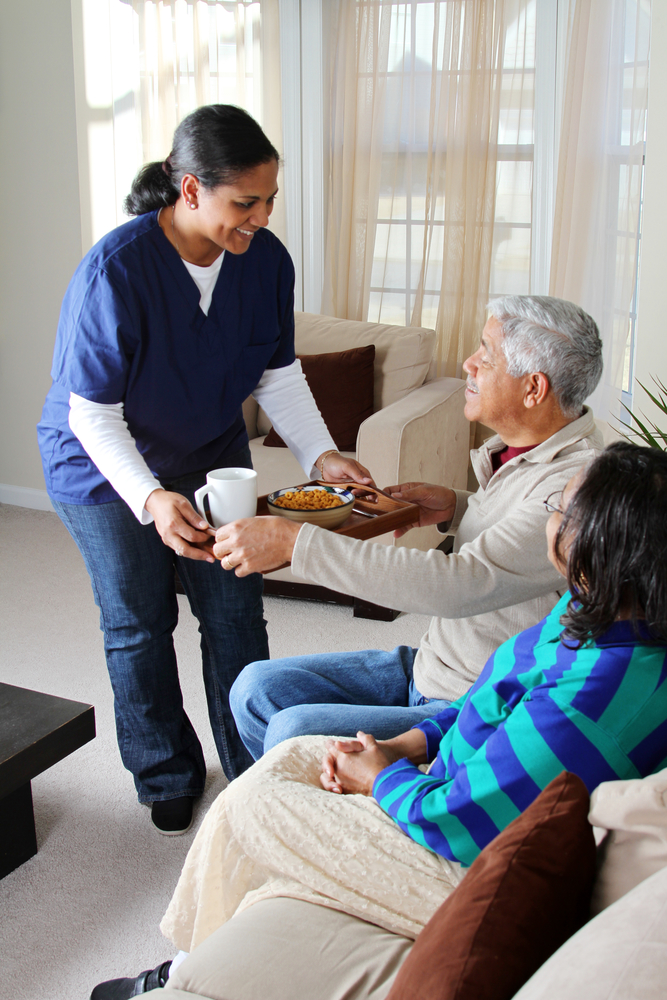Compassionate Senior Home Care in Vero Beach, FL
"There's No Place Like Home."


What Is Home Care?
Courtesy of The Home Care Association of Florida (HCAF)
Our senior home care in Vero Beach, FL, includes a broad range of medical, therapeutic, and support services provided by trained home care providers. These services are delivered in the comfort of one’s home to individuals recovering from illness, living with chronic or terminal conditions, or needing help with daily activities such as bathing, dressing, or mobility.
Home care is ideal for individuals who prefer to remain in their homes but require ongoing support beyond what family or friends can offer. Many seniors in Vero Beach are choosing non-institutional care options to maintain their independence as their physical needs evolve. Likewise, younger adults recovering from surgery or managing disabilities are turning to home care providers for personalized care at home.
Even medically complex care—such as that required by chronically ill children or individuals with terminal conditions—is now commonly delivered in-home, where patients can heal in a familiar, supportive environment.
As hospital stays become shorter, more patients depend on skilled home care providers to manage their recovery at home. For many, we offer a safer, more comfortable alternative to institutional care, with services tailored to each individual’s unique needs.
Why Home Care?
Home care is cost-effective. Numerous studies have shown that home care is generally the most cost-effective care option. Used prior to, in place of, or after hospitalization, home care can reduce the length of stay and save money over the course of an illness.
Home care keeps people independent. With agencies’ assistance, persons of all ages can continue to function as viable members of the community.
Home care keeps families together. The joy of being with loved ones is particularly important in times of illness, and keeping families together has a positive social and economic impact on our communities.
Home care involves the individual and the family in the care that is delivered. Home care is patient-centered — it empowers individuals and their families to assume greater responsibility for their own health, and to assist them in making informed health care decisions.
Time and Type of Services Available
Understanding the different types of services available for home care can be confusing, to say the least. The following list is designed to clear up some of the confusion.
Length of Care
- Hourly: Hourly care can be provided by an agency’s companion or homemaker, certified nursing assistant (CNA), home health aide (HHA), licensed practical nurse (LPN), or registered nurse (RN). The agency’s caregiver can provide care available under their licensure/certification, as well as companion/homemaker services. A minimum of five hours of care is required. RN, LPN, and bed-and-bath visits are also available.
- 24-hour care: This level of care and service is when an agency’s home health professional is awake and ready to attend to a patient’s needs 24 hours a day. The level of service usually, with rare exceptions, applies to home health aide care. This level of care requires multiple shifts by care providers over the 24-hour period. Provision of this service is via private pay and the use of long-term care insurance.
- Visits: A visit is when the agency’s health professional, aide, or nurse, comes into a patient’s home or residence and performs certain specific tasks or duties. A visit can last up to an hour, but is defined, time-wise, by the completion of the required duties. When the tasks have been performed and completed, the visit is over. An example of a skilled nursing visit includes removing a dressing on a wound, documenting the wound in the client’s medical record, treating the wound, applying a new dressing on the wound, and monitoring the general health of the client. An example of a visit by an HHA includes assisting the client with undressing, helping the client bathe, and helping the client get dressed and changing bed linens.
Types of Care
- Homemaker/Companion/Sitter: A homemaker/companion is a person who cares for an elderly, handicapped, or convalescent individual or couple and can accompany them on trips, outings, and appointments, as well as prepare and serve meals. Companions are available for hourly, shift, or live-in care. The following are some of the possible services of a companion. Typical duties of homemaker/companions/sitters include but are not limited to: companionship and conversation; sorting and reading mail; arrange appointments; assistance with walking; letter writing and correspondence; reading; meal planning and preparation; making bed; answering the phone and door; basic grooming; apparel selection assistance; caring for indoor house plants; appointment reminders; entertainment (playing cards, sewing assistance, etc.); monitoring diet and eating habits; grocery shopping; medication reminders.
- CNA and HHA: CNAs and HHAs have a nursing assistant certificate. Nurse aides assist with bathing, dressing, toileting, grooming, eating, medication reminders, physical transfer, and those normal daily routines the client could perform for himself or herself were he/she physically capable. Nurse aides can also perform all the services of a companion or homemaker and are available hourly, for shift work, or on a live-in basis.
- Light Housekeeping vs. Full House Cleaning: A Moment’s Notice Health Care provides light housekeeping services as part of our overall in-home care to clean and organize the homes of seniors. This is only up to 15% of the caregiver’s time per visit. This is not a full house cleaning. We can also provide Full House Cleaning if requested. Call us for details.
Registered Nurse: RNs are licensed and maintain records for clients receiving nursing care. An RN develops medical plans for treatment and can maintain them or supervise their maintenance. An RN supervises LPNs and CNAs/aides.



Who Pays for Home Care?
Home care is paid for by a variety of sources. Benefits and requirements vary greatly, however. Major home care payment sources include:
- Patient/private pay – Home care agency’s services can be personally paid for. The scope of services and the charges are negotiated between the patient/family and the agency. For those whose resources do not cover home care, some home care agencies offer a sliding-scale fee schedule so that a family need only pay what they can afford.
- Long Term Care Insurance – Policy coverage varies. Generally, private long-term care insurance coverage is limited. The patient and family should check with their insurance agent to determine coverage specifics.
- Medicare – The patient must be under a physician’s plan of care, homebound and in need of part-time or intermittent skilled nursing care or occupational/physical/speech therapy. Eligible clients may receive a range of services, which include skilled nursing, home care aide, speech and occupational therapy, medical social work, and medical supplies/equipment. A Moment’s Notice Health Care is not a Medicare provider.
- Medicaid – This federal/state-administered medical assistance program provides services similar to Medicare for low-income people. No prior hospitalization or “skilled” level of service is required to qualify. Individuals do not need to be homebound.



Home Care By the Numbers
- 350,000+ – Florida seniors who use agency home care annually.
- $120 – Median daily cost for aide or companion services.
- $244 – Median daily cost for semi-private nursing home room.
- $5,411 – Medicare savings per patient when home care is used as the first post-acute care setting for a hip fracture.
- 424% – Savings realized by the Veterans Administration using home care.
- 490% – Approximate percentage of American seniors say they want to age in place and remain in their home.
- 10,000 – Number of Americans turning 65 and becoming Medicare beneficiaries every day since January 1, 2011.
- 1,900+ – Approximate number of home care agencies in Florida spanning from the Panhandle to the Florida Keys.
Why Choose Us
At AMNHC, we elevate home care services to a new standard through exceptional compassion and expertise. Our primary goal is to support families by offering individualized care solutions that cater specifically to the needs of seniors. We understand the emotional complexities of caregiving, which is why our dedicated team is committed to providing support and alleviating some of that burden.
What makes us truly unique? Our caregivers are not just trained professionals; they are compassionate individuals who prioritize empathy and respect. Every senior deserves dignified care that allows them to thrive in a familiar environment. With our thoughtfully designed senior home care services, we focus on improving the overall quality of life for your loved ones, whether through assistance with daily routines or specialized care.
Communication is crucial, and at AMNHC, we believe in keeping families informed and engaged throughout the care journey. Choose us for unparalleled dedication, customized care options, and a nurturing approach that feels just like home.
Experience the Freedom of Private Home Care
When considering options for loved ones’ care, private home care stands apart as a truly personalized solution that bridges the gap between independence and support. At AMNHC, we bring a premium approach to private home care in Vero Beach, FL, by offering tailored services that help clients maintain their lifestyle while addressing any unique needs.
Designed to Fit Your Life
What makes private home care unique? It’s a flexible, customized approach to caregiving that prioritizes personal preferences, health requirements, and companionship. Our caregivers are selected not just for their professional skills but for their ability to create meaningful human connections. Whether it’s assisting with tasks like meal preparation, medication reminders, or accompanying clients on appointments, every care plan is built with the individual in mind.
Extra Layers of Care and Attention
Private home care offers families peace of mind by ensuring your loved one receives individualized attention. Unlike shared caregiving environments, this service allows for a one-on-one focus, making every moment of care intentional and impactful. From assisting clients with chronic illnesses to fulfilling emotional companionship needs, private home care delivers far beyond the basics.
Why Private Home Care Matters
Many families choose private home care to maintain a loved one’s freedom while ensuring their safety and well-being. Whether your loved one values their routine or thrives in familiar surroundings, private home care ensures they receive the care they need without feeling displaced.
Additional Resources
- AARP Public Policy Institute: Understanding Medicare’s Home Health Benefit (2017)
- Consumer Reports: Before You Leave the Hospital, Figure Out What Help You’ll Need at Home (2016)
- Forbes: Medicare, Medicaid And Long-Term Care: Your Questions Answered (2017)
- Caregiving For A Loved One? How To Get The Help You Need (2019)
- 5 Simple Practices That Make a Big Impact on Senior Health (2019)
- How Small Changes to Improve Your Nutrition Lead to Better Mental and Physical Health for Seniors (2019)
FAQ
What types of home care services do you provide?
We offer a wide range of services, including personal care, companionship, and medication oversight, all aimed at supporting your loved one’s well-being.
How do you ensure the quality of your caregivers?
Our caregivers go through a thorough selection process, which includes background screenings, in-depth interviews, and comprehensive training, ensuring they provide the best possible care.
Is it possible to customize home care services?
Yes. We excel in creating personalized care plans that reflect the specific needs and preferences of each client.
How do I begin with your senior home care services?
Starting is easy. Just reach out to us to arrange a consultation where we will evaluate your loved one’s needs and develop a tailored care plan.
Do you offer continuous care options?
Absolutely. We provide various scheduling options, including 24/7 care, to ensure your loved one receives support whenever necessary.
